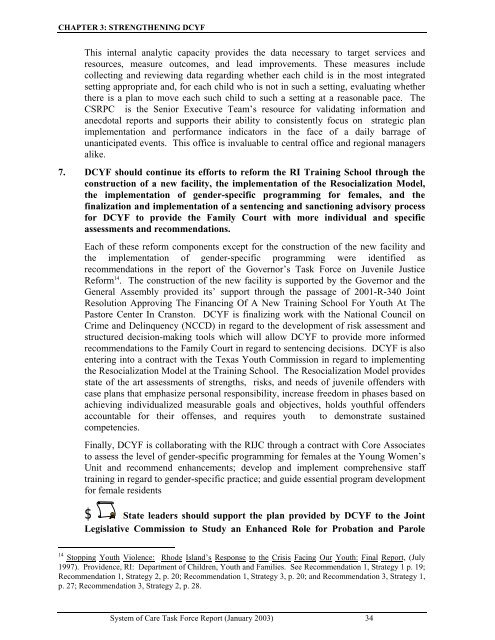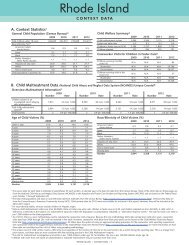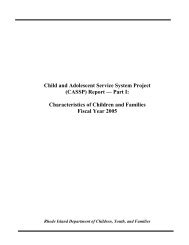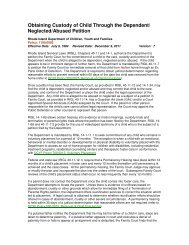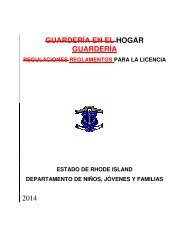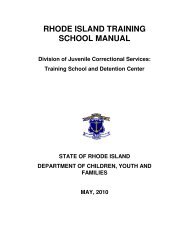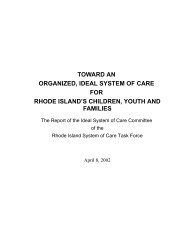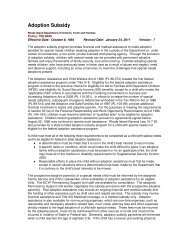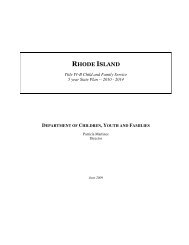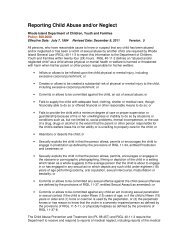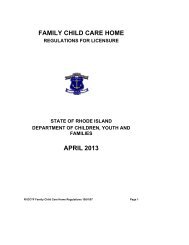Final Report - RI Department of Children, Youth & Families
Final Report - RI Department of Children, Youth & Families
Final Report - RI Department of Children, Youth & Families
Create successful ePaper yourself
Turn your PDF publications into a flip-book with our unique Google optimized e-Paper software.
CHAPTER 3: STRENGTHENING DCYF<br />
This internal analytic capacity provides the data necessary to target services and<br />
resources, measure outcomes, and lead improvements. These measures include<br />
collecting and reviewing data regarding whether each child is in the most integrated<br />
setting appropriate and, for each child who is not in such a setting, evaluating whether<br />
there is a plan to move each such child to such a setting at a reasonable pace. The<br />
CSRPC is the Senior Executive Team’s resource for validating information and<br />
anecdotal reports and supports their ability to consistently focus on strategic plan<br />
implementation and performance indicators in the face <strong>of</strong> a daily barrage <strong>of</strong><br />
unanticipated events. This <strong>of</strong>fice is invaluable to central <strong>of</strong>fice and regional managers<br />
alike.<br />
7. DCYF should continue its efforts to reform the <strong>RI</strong> Training School through the<br />
construction <strong>of</strong> a new facility, the implementation <strong>of</strong> the Resocialization Model,<br />
the implementation <strong>of</strong> gender-specific programming for females, and the<br />
finalization and implementation <strong>of</strong> a sentencing and sanctioning advisory process<br />
for DCYF to provide the Family Court with more individual and specific<br />
assessments and recommendations.<br />
Each <strong>of</strong> these reform components except for the construction <strong>of</strong> the new facility and<br />
the implementation <strong>of</strong> gender-specific programming were identified as<br />
recommendations in the report <strong>of</strong> the Governor’s Task Force on Juvenile Justice<br />
Reform 14 . The construction <strong>of</strong> the new facility is supported by the Governor and the<br />
General Assembly provided its’ support through the passage <strong>of</strong> 2001-R-340 Joint<br />
Resolution Approving The Financing Of A New Training School For <strong>Youth</strong> At The<br />
Pastore Center In Cranston. DCYF is finalizing work with the National Council on<br />
Crime and Delinquency (NCCD) in regard to the development <strong>of</strong> risk assessment and<br />
structured decision-making tools which will allow DCYF to provide more informed<br />
recommendations to the Family Court in regard to sentencing decisions. DCYF is also<br />
entering into a contract with the Texas <strong>Youth</strong> Commission in regard to implementing<br />
the Resocialization Model at the Training School. The Resocialization Model provides<br />
state <strong>of</strong> the art assessments <strong>of</strong> strengths, risks, and needs <strong>of</strong> juvenile <strong>of</strong>fenders with<br />
case plans that emphasize personal responsibility, increase freedom in phases based on<br />
achieving individualized measurable goals and objectives, holds youthful <strong>of</strong>fenders<br />
accountable for their <strong>of</strong>fenses, and requires youth to demonstrate sustained<br />
competencies.<br />
<strong>Final</strong>ly, DCYF is collaborating with the <strong>RI</strong>JC through a contract with Core Associates<br />
to assess the level <strong>of</strong> gender-specific programming for females at the Young Women’s<br />
Unit and recommend enhancements; develop and implement comprehensive staff<br />
training in regard to gender-specific practice; and guide essential program development<br />
for female residents<br />
$ State leaders should support the plan provided by DCYF to the Joint<br />
Legislative Commission to Study an Enhanced Role for Probation and Parole<br />
14 Stopping <strong>Youth</strong> Violence: Rhode Island’s Response to the Crisis Facing Our <strong>Youth</strong>: <strong>Final</strong> <strong>Report</strong>, (July<br />
1997). Providence, <strong>RI</strong>: <strong>Department</strong> <strong>of</strong> <strong>Children</strong>, <strong>Youth</strong> and <strong>Families</strong>. See Recommendation 1, Strategy 1 p. 19;<br />
Recommendation 1, Strategy 2, p. 20; Recommendation 1, Strategy 3, p. 20; and Recommendation 3, Strategy 1,<br />
p. 27; Recommendation 3, Strategy 2, p. 28.<br />
System <strong>of</strong> Care Task Force <strong>Report</strong> (January 2003) 34


